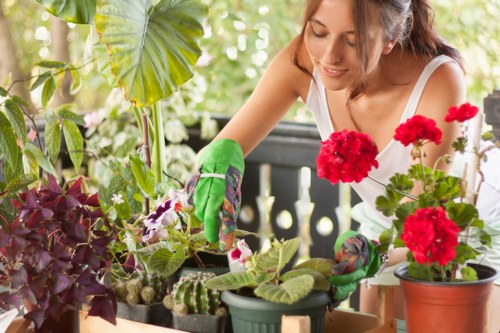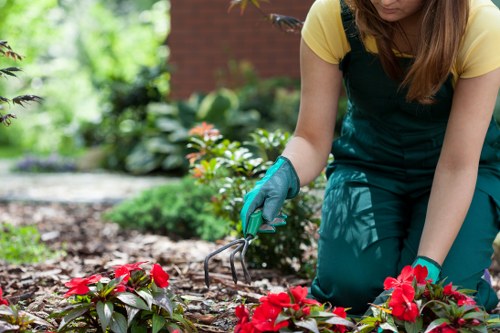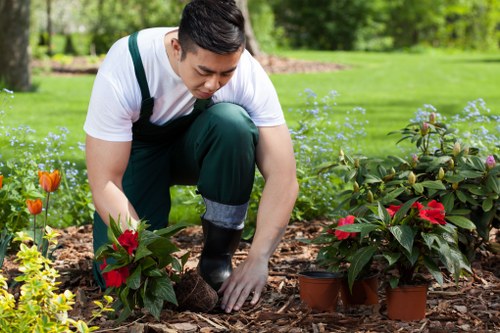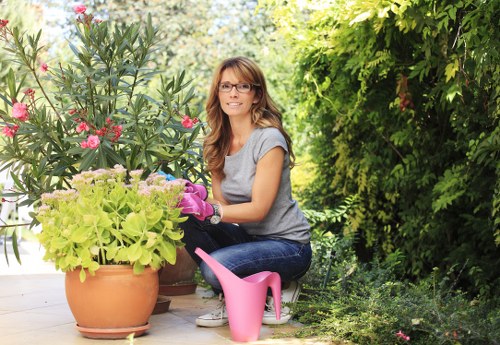Comprehensive Guide to Garden Maintenance in Melton
Introduction to Garden Maintenance

Maintaining a beautiful garden in Melton requires a combination of knowledge, effort, and the right tools. Whether you're a seasoned gardener or a beginner, understanding the fundamentals of garden care can transform your outdoor space into a vibrant and thriving oasis.
Melton, with its unique climate and soil conditions, offers both challenges and opportunities for gardeners. Proper maintenance not only enhances the aesthetic appeal of your garden but also promotes healthy plant growth and sustainability.
In this guide, we'll explore essential garden maintenance practices tailored specifically for Melton residents. From soil preparation to pest control, we've got you covered.
Understanding Melton’s Climate and Soil

Melton experiences a temperate climate with distinct seasons, which significantly impacts garden maintenance routines. Summers can be hot and dry, while winters are cool with occasional frost. Understanding these climatic patterns is crucial for planning your garden activities throughout the year.
The soil in Melton varies, but it's generally classified as clay loam, which is fertile but can pose drainage challenges. Conducting a soil test is recommended to determine pH levels and nutrient content, enabling you to amend the soil as needed for optimal plant health.
Proper soil preparation involves adding organic matter, such as compost or well-rotted manure, to improve soil structure, drainage, and nutrient availability. Mulching is also beneficial in retaining moisture and suppressing weeds.
Essential Garden Maintenance Tasks

1. Regular Watering
Consistent watering is vital, especially during the hot summer months. It's best to water your garden early in the morning or late in the evening to reduce evaporation. Installing a drip irrigation system can ensure efficient water usage and targeted delivery to plant roots.
2. Pruning and Trimming
Pruning helps maintain the shape of your plants, encourages healthy growth, and removes any diseased or damaged branches. Timing is important; most pruning should be done during the dormant season to minimize stress on the plants.
3. Weeding
Weeds compete with your garden plants for nutrients, water, and light. Regular weeding prevents them from becoming invasive. Using mulch can significantly reduce weed growth by blocking sunlight.
Seasonal Garden Maintenance

Spring Maintenance
- Preparing soil by adding compost
- Planting perennials and annuals
- Pruning shrubs and trees
- Applying mulch to control weeds
Summer Maintenance
- Regular watering and irrigation management
- Monitoring for pests and diseases
- Deadheading flowers to promote continued blooming
- Maintaining lawn health through mowing and aeration
Pest and Disease Control

Gardens are susceptible to a variety of pests and diseases, which can hinder plant growth and overall garden health. Implementing integrated pest management (IPM) strategies can help control these issues effectively.
IPM involves monitoring pest populations, encouraging natural predators, and using organic or chemical controls only when necessary. Regular garden inspections can help identify problems early, making them easier to manage.
Cultural practices such as crop rotation, proper spacing, and sanitation can also reduce the incidence of pests and diseases in your garden.
Soil Health and Fertilization
Maintaining Soil Fertility
Healthy soil is the foundation of a thriving garden. Regularly testing your soil can help you understand its composition and nutritional needs.
Organic Amendments
Incorporating organic matter like compost improves soil structure, enhances microbial activity, and increases nutrient availability to plants.
Fertilization
Based on your soil test results, apply the appropriate fertilizers to address nutrient deficiencies. It's important to follow recommended application rates to avoid over-fertilization, which can harm plants and the environment.
Weed Management Strategies
Preventative Measures
Preventing weeds is more effective than battling them after they've taken root. Using mulch, maintaining healthy plants, and ensuring proper spacing can minimize weed growth.
Manual and Mechanical Control
Hand-pulling and hoeing are effective for small-scale weed management. For larger areas, mechanical tools like cultivators can help remove weeds efficiently.
Herbicides
As a last resort, consider using herbicides. Opt for selective herbicides that target specific weeds without harming your desired plants. Always follow label instructions and safety guidelines when applying chemicals.
Lawn Care in Melton
Grass Selection
Choosing the right grass type is crucial for a lush and resilient lawn. In Melton, warm-season grasses like Buffalo or Couch are popular choices due to their adaptability to the local climate.
Mowing Practices
Regular mowing promotes healthy grass growth. It's recommended to mow at the highest recommended height to encourage deeper root systems and shade out weeds.
Seasonal Lawn Maintenance
- Spring: Aerate the lawn and apply a balanced fertilizer
- Summer: Maintain consistent watering schedules
- Autumn: Overseed and fertilize to prepare for winter
- Winter: Minimize foot traffic and protect the lawn from frost
Plant Selection and Care
Choosing the Right Plants
Selecting plants that are well-suited to Melton's climate and soil conditions is essential for successful garden maintenance. Consider native plants, which are adapted to the local environment and require less maintenance.
Planting Techniques
Proper planting techniques, including correct depth and spacing, ensure that plants establish well and have enough room to grow. Water thoroughly after planting to help settle the soil around the roots.
Ongoing Plant Care
Regularly monitor plants for signs of stress, disease, or pests. Prune as necessary to maintain plant health and appearance. Deadhead spent flowers to encourage new blooms.
Mulching for a Healthy Garden
Benefits of Mulching
Mulch serves multiple purposes in garden maintenance. It helps retain soil moisture, regulate soil temperature, suppress weed growth, and improve soil structure as it decomposes.
Types of Mulch
- Organic Mulch: Includes materials like bark, straw, and compost
- Inorganic Mulch: Such as gravel, plastic sheeting, and landscape fabric
Application Tips
Apply mulch to a depth of 2-3 inches, keeping it away from plant stems and tree trunks to prevent moisture buildup and rot. Replenish mulch as needed to maintain its effectiveness.
Garden Tools and Equipment
Essential Tools for Garden Maintenance
- Pruning shears and loppers
- Garden fork and spade
- Rakes and hoes
- Watering tools like hoses and sprinklers
- Wheelbarrows and garden carts
Tool Maintenance
Proper maintenance of garden tools extends their lifespan and ensures effective performance. Clean tools after use, sharpen blades regularly, and store them in a dry place to prevent rusting.
Sustainable Garden Practices
Water Conservation
Implementing water-saving techniques, such as rainwater harvesting and using drought-resistant plants, can reduce water usage and promote sustainability in your garden.
Composting
Composting organic waste not only reduces landfill use but also provides a rich source of nutrients for your garden. Set up a compost bin to recycle kitchen scraps and garden trimmings.
Eco-Friendly Pest Control
Using natural predators, such as ladybugs and birds, can help manage pest populations without relying on harmful chemicals. Additionally, planting companion plants can deter pests and promote biodiversity.
Lighting and Irrigation Systems
Garden Lighting
Proper lighting enhances the beauty of your garden while providing safety and security. Solar-powered lights are an eco-friendly option that reduces energy consumption.
Types of Garden Lighting
- Pathway lights
- Spotlights for highlighting features
- String lights for ambiance
Irrigation Systems
Installing an efficient irrigation system ensures that your plants receive the right amount of water without waste. Drip irrigation and soaker hoses are effective solutions for targeted watering.
Dealing with Common Garden Challenges in Melton
Managing Pests
Pests like aphids, caterpillars, and beetles are common in Melton gardens. Identifying the specific pests and implementing appropriate control measures is key to maintaining plant health.
Addressing Soil Compaction
Soil compaction can restrict root growth and reduce water infiltration. Aerating the soil regularly helps alleviate compaction and promotes healthier plant roots.
Handling Weeds
Persistent weeds can be a nuisance. Combining manual removal with preventive measures like mulching ensures long-term weed control.
Local Relevance: Serving Melton and Surrounding Areas
Nearby Areas to Melton
- Melton South - Just south of Melton, known for its community parks and family-friendly gardens.
- Hampton Park - Offers a mix of residential and commercial areas with well-maintained green spaces.
- Craigieburn - A growing suburb with numerous new housing developments and modern garden designs.
- Exford - Known for its rural charm and extensive property gardens.
- Flemington - Close to Melton, it features a blend of urban and suburban gardening styles.
- Toolern Vale - A scenic area with beautiful river views and well-kept gardens.
- Thurkapel - Offers a tranquil environment ideal for serene garden settings.
- Truganina - Rapidly developing with a focus on sustainable and modern gardening practices.
- Burnside - A peaceful locality with a strong emphasis on community gardens.
- Rockbank - Historic area with unique garden layouts and heritage plants.
- Wyndham Vale - Features a variety of garden styles, from traditional to contemporary.
- Hoppers Crossing - A vibrant area with diverse gardening needs and solutions.
- Deer Park - Known for its expansive lawns and ornamental flower beds.
- Sydenham - Offers a blend of residential gardens and public green spaces.
Each of these areas presents unique opportunities for garden maintenance services, ensuring that residents across Melton and its vicinity can achieve their gardening goals with expert assistance.
Choosing the Right Garden Maintenance Service
What to Look For
- Experience and expertise in local gardening conditions
- Comprehensive range of services, including pruning, weeding, fertilizing, and pest control
- Use of environmentally friendly practices and products
- Positive customer reviews and testimonials
- Competitive pricing and transparent quotes
Benefits of Professional Maintenance
Hiring a professional garden maintenance service can save you time and ensure that your garden receives the care it needs. Professionals bring specialized knowledge, access to the right tools, and the ability to handle complex gardening tasks efficiently.
Customized Maintenance Plans
Many services offer tailored maintenance plans that address the specific needs of your garden. This personalized approach ensures optimal plant health and garden aesthetics throughout the year.
DIY vs. Professional Garden Maintenance
Advantages of DIY
- Cost savings on labor
- Personal satisfaction from tending to your own garden
- Flexible scheduling
When to Consider Professionals
While DIY gardening can be fulfilling, certain tasks may require the expertise of professionals. Large-scale maintenance, pest infestations, and complex landscaping projects are better handled by experienced gardeners.
Hybrid Approach
Combining DIY efforts with professional services can be an effective strategy. Handle routine tasks yourself while outsourcing more demanding maintenance to experts.
Innovative Gardening Techniques
Vertical Gardening
Vertical gardening maximizes space by growing plants upwards on structures like trellises or walls. This technique is ideal for small gardens and can add visual interest to your outdoor space.
Hydroponics
Hydroponic gardening involves growing plants in a nutrient-rich water solution instead of soil. This method can be efficient and sustainable, reducing water usage and eliminating soil-borne diseases.
Permaculture
Permaculture focuses on designing gardens that mimic natural ecosystems. It emphasizes sustainability, biodiversity, and minimal maintenance, making it a great choice for eco-conscious gardeners.
Enhancing Garden Aesthetics
Choosing Color Schemes
Selecting a harmonious color palette can significantly enhance the visual appeal of your garden. Consider the blooming seasons of your plants to ensure year-round color variety.
Incorporating Hardscapes
Integrating elements like pathways, patios, and garden structures adds structure and interest to your garden. Hardscapes provide functional spaces for relaxation and entertainment.
Adding Water Features
Water features, such as fountains or ponds, introduce a calming element to your garden. They also attract wildlife and can serve as focal points for garden design.
Gardening for Wildlife
Attracting Beneficial Insects
Beneficial insects like bees, butterflies, and ladybugs play a crucial role in pollination and pest control. Planting a variety of flowering plants can attract these helpful creatures to your garden.
Creating Habitat for Birds
Providing shelter and food sources, such as birdhouses and native berry-producing plants, encourages birds to visit your garden. Birds help control insect populations and add liveliness to your outdoor space.
Supporting Native Wildlife
Using native plants supports local wildlife by providing familiar food and habitat options. Native species are often more resilient and require less maintenance, making them a sustainable choice for your garden.
Garden Safety and Accessibility
Ensuring Safe Garden Practices
- Wear protective gear when handling tools and chemicals
- Maintain clear pathways to prevent tripping hazards
- Use non-toxic pest control methods to protect family and pets
Accessible Garden Design
Designing your garden with accessibility in mind ensures that everyone can enjoy the space. Features like raised beds, wide paths, and seating areas accommodate individuals with mobility challenges.
Universal Design Principles
Incorporate universal design principles to create a garden that is both beautiful and functional for people of all abilities. This includes easy-to-reach plants, smooth surfaces, and clear signage.
Budgeting for Garden Maintenance
Creating a Maintenance Budget
Establishing a budget helps manage expenses related to garden maintenance. Consider factors like labor costs, materials, tools, and any additional services you may require.
Cost-Effective Maintenance Tips
- Use native plants to reduce water and maintenance needs
- Recycle organic waste for composting
- Invest in quality tools that last longer
- Plan garden projects to spread costs over time
Maximizing Value
Prioritize tasks that offer the most significant impact on your garden’s health and appearance. Strategic planning and efficient resource allocation ensure that your garden remains beautiful without breaking the bank.
Technological Innovations in Garden Maintenance
Smart Irrigation Systems
Smart irrigation systems use sensors and weather data to optimize watering schedules, ensuring that plants receive the right amount of water while conserving resources.
Garden Management Apps
Various apps help track garden activities, monitor plant health, and schedule maintenance tasks. These tools can enhance your gardening efficiency and organization.
Automated Tools
Automated garden tools, such as robotic lawn mowers and smart sprinklers, reduce the manual effort required for garden maintenance, allowing you to enjoy more leisure time.
Final Thoughts on Garden Maintenance in Melton
Embracing Continuous Learning
Gardening is an ongoing journey of learning and adaptation. Staying informed about the latest gardening techniques, plant varieties, and maintenance practices can help you maintain a vibrant and healthy garden.
Building a Community
Engaging with local gardening communities and professionals in Melton provides valuable support and inspiration. Sharing experiences and tips can enhance your gardening skills and foster a sense of camaraderie.
Enjoying Your Garden
Ultimately, the goal of garden maintenance is to create a space that brings joy, relaxation, and beauty to your life. Regular care and attention ensure that your garden remains a source of pride and enjoyment for years to come.
Contact us today to schedule your garden maintenance service in Melton and transform your outdoor space into a stunning haven.
